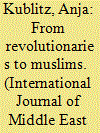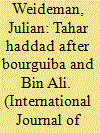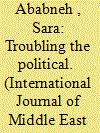|
|
|
Sort Order |
|
|
|
Items / Page
|
|
|
|
|
|
|
| Srl | Item |
| 1 |
ID:
145056


|
|
|
|
|
| Summary/Abstract |
This article analyzes in depth four main writings by the pioneering nahḍa intellectual Rifaʿa Rafiʿ al-Tahtawi, who drew on classical kinds of adab to articulate new kinds of political subjectivities. He especially draws on the image of the body politic as a body with the king at its heart. But he reconfigures this image, instead placing the public, or the people, at the heart of politics, a “vanquishing sultan” that governs through public opinion. For al-Tahtawi, adab is a kind of virtuous comportment that governs self and soul and structures political relationships. In this, he does not diverge from classical conceptions of adab as righteous behavior organizing proper social and political relationships. But in his thought, disciplinary training in adab is crucial to the citizen-subject's capacity for self-rule, as he submits to the authority of his individual conscience, ensuring not only freedom, but also justice. These ideas have had lasting impact on Islamic thought, as they have been recycled for the political struggles of new generations.
|
|
|
|
|
|
|
|
|
|
|
|
|
|
|
|
| 2 |
ID:
145058


|
|
|
|
|
| Summary/Abstract |
Exploring generational changes and continuities among Palestinian families in Denmark, this article investigates why the children of the fidāᵓīn (fighters) and many of the fidāᵓīn themselves have turned their backs on secular politics and embraced Islam. The Palestinians who arrived in Denmark from Lebanon in the wake of the Lebanese Civil War were members of the Palestinian Liberation Organization and were known as the generation of the revolution (jīl al-thawra). Extending Karl Mannheim's approach to generations, I argue that in order to explain the transition among Palestinians in Denmark from revolutionaries to Muslims we can rely on neither genealogy nor historical context alone, but need to pay equal attention to the structural continuities that crosscut generations. I suggest that rather than conceive of revolutionaries and Muslims as oppositions, we should think of them as substitutions, as liminal becomings that are actualized across historical generations.
|
|
|
|
|
|
|
|
|
|
|
|
|
|
|
|
| 3 |
ID:
145057


|
|
|
|
|
| Summary/Abstract |
Under the Bourguiba and Bin ʿAli regimes, the early 20th-century women's rights advocate Tahar Haddad (1899–1935) was a symbol of “state feminism.” Nationalist intellectuals traced the 1956 Personal Status Code to Haddad's work, and Bourguiba and Bin ʿAli claimed to “uphold” his ideals and “avenge” the persecution he suffered at the hands of the ʿulamaʾ at the Zaytuna mosque-university. Breaking with “old regime” narratives, this article studies Haddad as a reformist within Tunisia's religious establishment. Haddad's example challenges the idea that Islamic reformists “opened the door to” secularists in the Arab world. After independence, Haddad's ideas were not a starting point for Tunisia's presidents, but a reference point available to every actor in the political landscape.
|
|
|
|
|
|
|
|
|
|
|
|
|
|
|
|
| 4 |
ID:
145055


|
|
|
|
|
| Summary/Abstract |
This article explores the rhetorical function of al-Andalus (medieval Spain) in modern Syrian popular culture, with a focus on music. The rhetoric of al-Andalus in Syria is intimately related to the project of nation building. The nostalgic performance of links between modern Syria and medieval al-Andalus assumed great rhetorical force in the 1960s as a result of ideologies of pan-Arabism, the loss of Palestine, the rise of Islamist threats at home, and the emergence of petrodollar regimes in the Arabian Gulf. As a result, the rhetoric of al-Andalus became “good to think” for wide audiences of Syrians. Musical genres linked to al-Andalus play an important role as potent vehicles for constructing Syrian memory cultures. Drawing on heavily mythologized and nostalgic visions of an Andalusian golden age, musical performance in Syria sonically reinforces forms of nostalgic remembrance and enacts claims on Syrian pasts, presents, and futures.
|
|
|
|
|
|
|
|
|
|
|
|
|
|
|
|
| 5 |
ID:
145059


|
|
|
|
|
| Summary/Abstract |
The Jordanian Day-Waged Labor Movement (DWLM) played a central role in the Jordanian Popular Movement (al-Hirak al-Shaʿbi al-Urduni), commonly referred to as Hirak, from 2011 to the end of 2012. The large number of women who were active and took on leading roles in the DWLM contrasts with the absence of women's rights organizations in the Hirak. I argue that the DWLM was able to attract so many women because it developed a discourse and flexible structure that understood women to be embedded within communities and prioritized their economic needs. By studying this discourse and structure, it is possible to learn important lessons about gender-inclusive political and institutional reform.
|
|
|
|
|
|
|
|
|
|
|
|
|
|
|
|
|
|
|
|
|